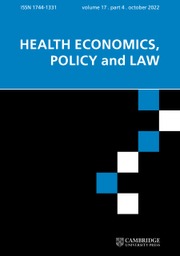Article contents
Double-edged sword of federalism: variation in essential health benefits for mental health and substance use disorder coverage in states
Published online by Cambridge University Press: 06 January 2020
Abstract
The Affordable Care Act requires all insurance plans sold on health insurance marketplaces and individual and small-group plans to cover 10 Essential Health Benefits (EHB), including behavioral health services. Instead of applying a uniform EHB plan design, the Department of Health and Human Services let states define their own EHB plan. This approach was seen as the best balance between flexibility and comprehensiveness, and assumed there would be little state-to-state variation. Limited federal oversight runs the risk of variation in EHB coverage definitions and requirements, as well as potential divergence from standardized medical guidelines. We analyzed 112 EHB documents from all states for behavioral health coverage in effect from 2012 to 2017. We find wide variation among states in their EHB plan required-coverage, and divergence between medical-practice guidelines and EHB plans. These results emphasize consideration of federated regulation over health insurance coverage standards. Federal flexibility in states benefit design nods to state-specific policymaking-processes and population needs. However, flexibility becomes problematic if it leads to inadequate coverage that reduces access to critical health care services. The EHBs demonstrate an incomplete effort to establish appropriate minimum standards of coverage for behavioral health services.
- Type
- Article
- Information
- Copyright
- Copyright © Cambridge University Press 2020
References
- 4
- Cited by



